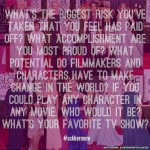 Once a year, we Americans come together with our family or friends to give thanks. While the deeper meaning often gets trumped by delicious food and wine, Thanksgiving provides us with one day to relax and enjoy ourselves. What if the anticipation, laughter, enjoyment and camaraderie that we find with family or friends could be experienced at work? Imagine how different the workplace would be. It might look something like this…we would:
Once a year, we Americans come together with our family or friends to give thanks. While the deeper meaning often gets trumped by delicious food and wine, Thanksgiving provides us with one day to relax and enjoy ourselves. What if the anticipation, laughter, enjoyment and camaraderie that we find with family or friends could be experienced at work? Imagine how different the workplace would be. It might look something like this…we would:
- Look forward to going into work every day
- Greet co-workers with joy
- Enjoy stimulating conversations
- Share stories and memories
- Laugh until our sides hurt
- When we felt tired or cranky, we would take a nap and wake up refreshed, ready for more food and conversation!
This is an extreme picture, yet there are threads in each of these behaviors that can be done on a daily basis. What if you arrived at work every day truly thankful for your job? What it has taught you? The income it provides to you? What it allows you to do in life?
My father spent his entire “career” – more than 40 years – working in a steel mill when steel was king in America. He started work at the age of 17, before the mills were organized through the United Steel Workers of America (USW). It was hard, physical work. Even when he experienced the occasional migraine headache, he never complained or missed work. He worked hard, saved his money, and was a good provider to our family of six.
Living through the Great Depression, he knew the value of having a job, being able to buy a home, a car, food for our family and even car vacations touring America. He took his thanks to the mill every working day, remaining positive until the day he retired.
On Thanksgiving Day, he would feast like a king. He looked forward to being with family, enjoying a full plate of food (and sometimes seconds), laughing, telling stories, and even taking a nap when needed.
As you enjoy Thanksgiving dinner and other activities, think of how you can bring that same contentment, happiness and thanks giving into your workplace. What a gift you would give to co-workers if you expressed your thanks on the job every day. Yes, it would be a very different world if we all did that.









